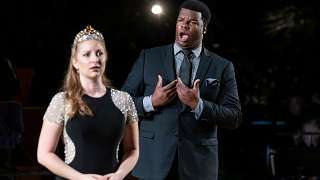|
Back
Dido and Aeneas Reign in Palm Beach Palm Beach
Norton Museum of Art
12/11/2021 -
Henry Purcell: Dido and Aeneas
Bergsvein Toverud (Court Singer), Megan Callahan (Dido), Avery Boettcher (Belinda), Alexandra Razskazoff (2nd Woman), Christopher Humbert, Jr. (Aeneas), Meridian Prall (Sorceress), Maria Vasilevskaya (1st Witch), Megan Graves (2nd Witch), Marissa Moultrie (Spirit), Steven Ricks (Sailor), Moisés Salazar, Heeseung Chae, Ian Rucker, Kyle White (Chorus)
Palm Beach Opera Orchestra, Gregory Ritchey (conductor)
Drew Minter (director), Timm Burrow (Costume Director), Jason Barroncini (Technical Director)

M. Callahan, C. Humbert (© Kelly O’Brien)
The Palm Beach season starts earlier and earlier than the standard after-New Years rounds of parties and galas that once characterized the chic island town and its environs. This year the Symphony and Chamber Arts ensembles returned to performance in November. The local ballet and touring events were firmly in place by December. Palm Beach Opera’s season normally runs January through March, but David Walker, its innovative general and artistic director, moved up the opening of the season – the company’s sixtieth – with this semi-staged performance of Henry Purcell’s best-known work. Its presentation also fits his newly created Discovery Series, which features a more intimate performance of relatively neglected works given by singers drawn from the company’s highly competitive Benenson Young Artist and Artist Apprentice programs. A reduced orchestration with keyboard accompaniment (in this case a harpsichord/organ) stands in for the full orchestra, while a small ensemble of singers plays the role of the chorus.
Last season the series began with a well received presentation of Bellini’s I Capuleti e i Montecchi, a non-Shakespearean version of the Romeo and Juliet story. The setting – the outdoor sculpture garden of West Palm Beach’s recently renovated and impressively expanded Norton Museum of Art – competes with crickets and airplanes, but offers and appealing Renaissance feel evoking opera’s earliest days as a home entertainment. A lavish dinner and cocktail hours precedes the performance, this time with a passed dessert reception following it.
Dido and Aeneas rarely draws the attention of leading companies, though a spate of new productions cropped up for the occasion of its 350th anniversary, in 2009. More the stuff of university-level opera workshops, it clocks in at just over an hour, and much of its original music is missing. For this performance, which is Palm Beach’s premiere production of the work, director Drew Minter poached other selections of Purcell’s œuvre. The additions include a prologue for Dido’s court as well as a free-standing song, “What shall I do,” which gives Aeneas an aria he otherwise lacks. Finally, an epilogue is drawn from music Purcell composed for the funeral of Queen Mary II of England, who patronized him during her five years on the throne (1689-1694) after deposing her father in the “Glorious Revolution,” which implanted parliamentary supremacy in England.
Drawn from Book IV of Virgil’s Aeneid, the opera’s plot is one of the classical tradition’s best known. Dido, the Queen of Carthage, has welcome refugees from the devastated city of Troy and fallen in love with their leader Aeneas, who is destined to be the founder of Rome. In this version a mean and spiteful sorceress sends him on his way, leading Dido to believe she has been abandoned. She sings of her despair before expiring, but here we are spared the funeral pyre for her usual self-immolation.
Palm Beach Opera has chosen wisely in its young artist appointments. The appealing mezzo-soprano Megan Callahan sang minor roles in the company’s innovative outdoor festival presentation of three standard repertory works last February – the first opera performances in North America since the Covid-19 pandemic began. Here she was poignant, conveying sorrow over a layer of strength and despair that floated on a warm texture of dignity. Christopher Humbert, Jr.’s Aeneas was authoritative and strong, with a solid technique that portends a future of great note. Meridian Prall’s sorceress avoided caricature in executing her central deception. The other young singers acquitted themselves well.
Gregory Ritchey has a conducting career of national importance as well as an impressive record as a recital pianist. A Palm Beach Opera associate conductor, he showed a true talent for sizing down the larger score for the purposes of this unique format and presentation. It augurs well for the major stage works coming in the new year and left the listeners guessing what rarer work we might discover here next.
Paul du Quenoy
|